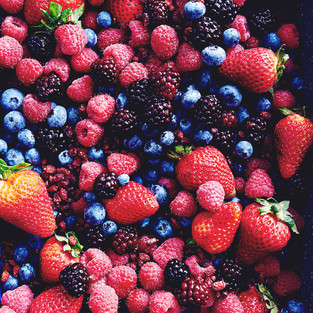Let's Talk Macronutrients-Carbohydrates
- Brittany
- Feb 5, 2019
- 4 min read
Updated: Apr 24, 2019
To start my first Nutrition 101 blog post, I thought what better way to start than a three part series on the topic of macronutrients. Macronutrients, as defined by the Merriam Webster dictionary, are a type of food required in large amounts in the diet. These are the major nutrition components that make up the foods we eat. The three major macronutrients are carbohydrates, fats, and proteins. Let's be honest, when we think of carbohydrates, fats, and proteins, certain foods or food groups automatically come to mind. Let's focus on carbohydrates. Maybe you think of carbs as bread, pasta, oatmeal, and grains exclusively. I know when I first began an interest in nutrition, I thought carbohydrates were just found in these foods (bread and noodles) that "make you gain weight." Little did I know how important carbohydrates are and how widely they are found in the foods we enjoy. Carbohydrates are found, yes in grains, but also in beans, dairy, fruit, starchy vegetables, and alcohol. Woah, way more than just bread and pasta.
What are Carbohydrates?
Carbohydrates provide regulation of blood sugar.
Carbohydrates prevent the breakdown of proteins for energy.
Carbohydrates provide fiber for good digestion.
They prevent the breakdown of skeletal muscle and other tissues.
Carbohydrates are divided into two categories-simple and complex.
Simple carbohydrates include foods made up of one or two sugars, which means that these carbs are more easily digested, absorbed, and used quickly. These simple carbohydrates include monosaccharides and disaccharides, meaning one or two sugars respectively. Monosaccharides include glucose (the body's preferred energy source), fructose (in fruit), and galactose (from milk), while disaccharides include lactose (think dairy products), sucrose (the table sugar you're used to hearing about), and maltose (found in some vegetables). These simple sugars are also the sugars found in soft drinks, cookies, cakes, and ice cream but the difference between a banana and a cookie comes down to the vitamins, minerals, and fiber you are going to get from the banana versus the "empty calories" from the cookie. Complex carbohydrates are oligosaccharides and polysaccharides which are the carbohydrates with three or more sugars. Oligosaccharides, 3-10 sugars, are typically found in sports drinks and beans while polysaccharides are long chains of sugars that make up starches and fibers. These are the "starchy" foods we most commonly think of when we think carbohydrates, bread, pasta, corn, potatoes, and peas. Choosing whole grain breads, wraps, and pasta over white breads will provide a more stable carbohydrate source and fiber than white breads typically provide. This means they will not be digested as quickly and leave you hungry in an hour with a "crashing" feeling.
Now that we're gotten what carbohydrates are, what do carbs do? Carbohydrates, whether simple or complex, are broken down to produce energy for immediate use as glucose or stored as glycogen in the cells for future energy needs. Carbohydrates are the most important fuel for muscle cells. Cells rely on glucose (a simple sugar) for energy and the brain and nerves use only glucose as the fuel for energy production. Fun fact, each and every day your brain consumes about 130 grams of glucose! It does not matter if you eat a simple or complex carbohydrate, it is all broken down into glucose for use but the speed of that breakdown is dependent on how difficult it is for the body to break that food down, so polysaccharides will take longer than monosaccharides to break down. Now, I'm not telling you to go out and eat carbs all day long, BUT they are an important part of a healthy digestive system (thank you fiber), regulation of blood sugar, a good energy source, and contain lots of vitamins and minerals that your body needs (remember fruits and some veggies count as carbohydrates too).
Long story short, Carbohydrates as a whole are NOT the enemy. Carbohydrates on their own will not cause weight gain. You need some carbohydrates in your daily diet for energy production, brain health, and fiber to help with digestion. Try to choose carbohydrate sources such as dairy, fruit, vegetables, and whole grains over cookies, white bread, french fries, and foods with lots of processing and added sugars. Focus on the nutrition content, vitamins, minerals, and fiber, of the type of carbohydrate you're consuming and picking whole foods is always better than a highly modified and processed food with lots of added sugar. Added sugar is the thing we really want to avoid, the naturally occurring sugar (like the fructose in fruit) is okay! But keep in mind, everything in moderation, even "good" foods can be bad if you eat too much!
I am doing another post just about fiber and why it is essential to a healthy, balanced diet so stay tuned!!
Fun Facts about Carbohydrates:
Potatoes contain 2x the potassium than a banana, which helps with relieving muscle cramps, fluid balance, and nerve signals as well as lower blood pressure and improve heart health.
Sweet potatoes are rich in Vitamin A, C, and potassium and are a good antioxidant source.
Oats have loads of fiber and a good protein source for a grain, which makes them super filling and may regulate blood sugar and lower cholesterol.
Blueberries have Vitamin C, K, and Manganese and are a great antioxidant.
Chickpeas are a great source of fiber and plant-based protein while also containing B vitamins, iron, and phosphorus.
Carbohydrates contain 4 calories per gram. So say you eat 20g of carbohydrates, that would be 80 calories from carbohydrates in that food, which is tied with protein for the lowest calorie per gram macronutrient!
U. S. Dietary Guidelines state that 45-65% of calories each day should come from carbohydrate sources.
Some of my personal favorite carbohydrate sources include:
Whole wheat bread and wraps
Oatmeal
Beans (black beans and chickpeas)
Sweet potatoes
Quinoa
Pancakes
Oatmeal
All the fruit! Especially berries and bananas
Tomatoes
Greek yogurt
Cheese
Sources: Murray R and Kenny L. Practical Guide to Exercise Physiology. Human Kinetics. 2016. 23-44.
Nelms M, Sucher K, Lacey K. Nutrition Therapy and Pathophysiology. Cengage. 2016.
Gropper S and Smith J. Advanced Nutrition and Human Metabolism 7th ed. Cengage. 2018. 61-103.
Harvard T.H. Chan. Carbohydrates-The Nutrition Source. Harvard T.H. Chan Website. https://www.hsph.harvard.edu/nutritionsource/carbohydrates/.



















Comments